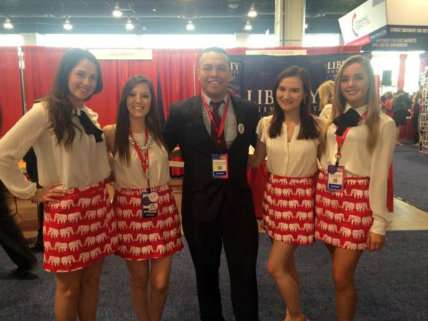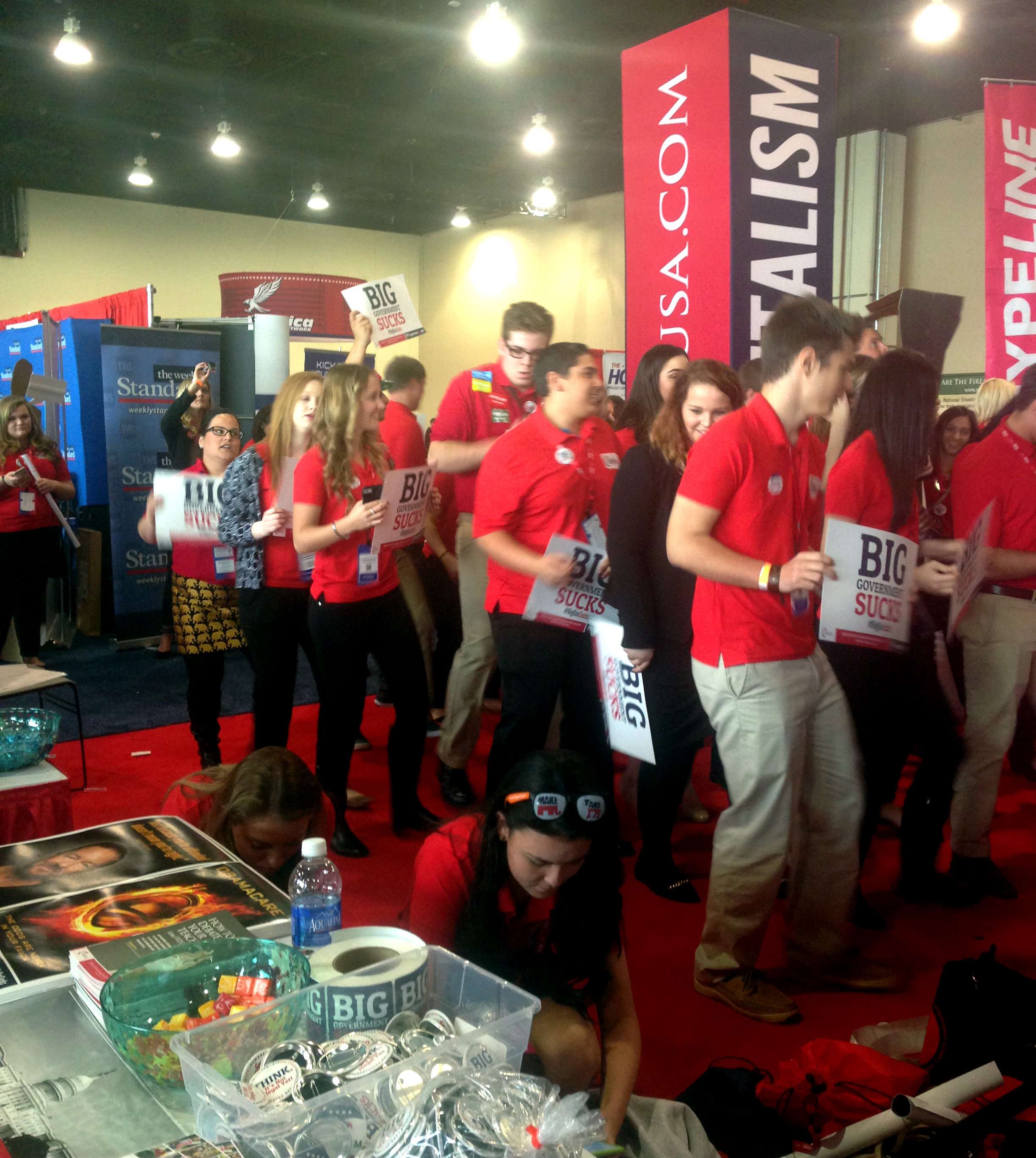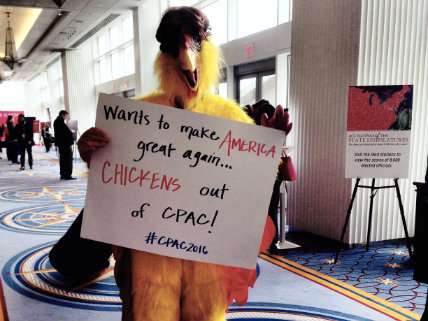Young Republicans Mourn Rand Paul, Trash Trump, and Pledge to 'Make America Dope Again' at CPAC 2016
At "coachella for conservatives," Republican college students were "still Randing," feeling the "Marcomentum," and pledging #NeverTrump.

"I just got a selfie with Rick Santorum!" squeals a young woman to her friend as I pass them in crowded corridor at the Gaylord National Resort and Convention Center. It's the opening morning of this year's Conservative Political Action Conference (CPAC), an annual event for right-leaning leaders, activists, and media, as well as rank-and-file Republicans. And unlike most GOP gatherings, this one tends to be heavily populated with young people, especially conservative college students—in previous years, at least 40 percent of CPAC attendees were students and more than half of all attendees were between the ages of 18 and 29.
Overall, the vibe at this year's conference—which included a well-attended Republican debate watching party on the ballroom big-screen Thursday night—was decidedly anti-Trump. Whether it was Sen. Marco Rubio teasing Trump during the debate or panel speakers obliquely criticizing the party frontrunner, taking shots at the Donald drew ample affirmation from CPAC crowds, who had much more love for Rubio and Texas Sen. Ted Cruz. The young people of CPAC seemed to share these sentiments, with perhaps even less love for Trump, plus a heartening dose of support for Libertarian Party (LP) candidates and mourning for the failed candidacy of Kentucky Sen. Rand Paul.
Caroline Craig, a 21-year-old student at East Carolina University (ECU), says her school has a significant student-conservative population, but "it's really mixed" which presidential candidates they like. "A lot of people at ECU tended to be Rand Paul supporters" and "were very, very sad when he dropped out," she tells me on the closing afternoon of the conference. There are some Trump supporters in ECU's conservative quarters, "but they tend to be more the fraternity boys."
Make America Dope Again
Craig is one of around two dozen young women walking around the conference in matching red elephant-print skirts, generally paired with high-heels and bright lipstick. They are part of an organization called Future Female Leaders of America (FFL), which seems to have a dual mission of being an online hub for young conservative women and hawking FFL merchandise. The FFL website describes its mission as helping to "inspire young women to become more politically aware and informed."

Nearby FFL at CPAC is Turning Point USA, a college conservative group that dominates the middle of the expo floor with an energetic horde of male and female representatives dressed in red polos and khaki pants. On the opening day of CPAC, the group blasts pop and hip-hop music and dances enthusiastically, students brandishing "Big Government Sucks" signs and hoisting large cardboard cutouts of the GOP presidential candidates above them like foam glow sticks at a bad club. It might sound cringe-inducing, but they actually bring a nice dose of spunk and youthful energy to the otherwise same-old, same-old CPAC scene—the Heritage Foundation, the NRA, the tables featuring pictures of flags and fetuses and bald eagles.
"The only thoughts I had during CPAC had to do with how awesome it is that so many young conservatives were there to make America dope again," tweeted student Danielle Butcher during the conference (she also called for Rand Paul to please come back). Another young attendee referred to CPAC on Twitter as "coachella for conservatives."
"I was not prepared for so many people to be in one area, and so many big names to be in one area," says Marie Pecher, a first-time CPAC attendee from the University of Pittsburgh, when I talk to her in front of the FFL booth on Saturday. On her campus, Pecher says there was a lot of support ofr Paul and New Jersey Gov. Chris Christie. But "as more candidates jump out, a lot of [conservative students] are jumping on the Cruz and Rubio train, as opposed to Trump."
The Missing Candidates
Trump was slated to speak at CPAC Saturday morning but canceled on Friday, the same day Ben Carson announced that he was suspending his campaign. In the straw poll called at the end of the conference,Texas Sen. Ted Cruz won with 40 percent of attendee votes, followed by Rubio with 30 percent, Trump with just 15 percent, and Ohio Gov. John Kasich with 8 percent.
Very disappointed @realDonaldTrump has decided at the last minute to drop out of #CPAC -- his choice sends a clear message to conservatives.
— CPAC (@CPAC) March 4, 2016
Pecher missed seeing Cruz speak at CPAC but had seen Rubio's talk that morning and Kasich the day before. "I really think that the 'Marcomentum' has definitely come to CPAC," she says. During Kasich's speech, "he had a lot of support but it wasn't like Rubio. There was a lot of standing ovations for Rubio, much more high energy for Rubio than for Kasich."
Among students I talked with at CPAC, ??that was the most anyone said about the Ohio governor. They were similarly silent about recently resigned candidates Jeb Bush, Ben Carson, Carly Fiorina, and Rick Santorum. But quite a few mentioned regrets—either personal or predominant among their conservative student friends—that Sen. Paul had dropped out of the presidential race.
University of Minnesota Duluth (UMD) sophomore Kalley Erickson says there's mostly been mixed support for Cruz, Rubio, and Trump among young CPAC attendees she talked with, although "people are still talking about Rand" and are disappointed he's no longer running for president. "I'm sad that he's out too," says Erickson, who serves as vice chair of her school's College Republicans club.
Paul visited UMD in November "and he was pretty popular." But during Paul's talk, "his approach, his presence, the way he talked… he seemed angry," she says. While Paul wasn't exactly mean, "he just seemed a little… scary."
"I've never seen him smile," adds Erickson. "He didn't even smile in the picture I took with him."
Prickliness and a short temper were accusations lobbed at Paul throughout his campaign, most notably during debates. It was a source of sore disappointment for those who hoped Rand would share the charisma and ability to generate enthusiasm that his dad, former Sen. Ron Paul, did.
Where the Libertarians Are
Ian Taylor is a student and vice chair of finances for the College Republicans club at Dordt College. In straw polls taken by the group, "it's different than national polls," says Taylor. "For instance, Donald Trump usually comes in single digits. We had a big students for Rand group, where he would come in double digits over Donald Trump." A lot of those Paul supporters are now supporting Cruz, he tells me, "and then some of them have switched over to more libertarian candidates like Gary Johnson."
I run into a Johnson enthusiast a few minutes later, alongside a peer who hopes that Johnson doesn't get the 2016 LP nomination. Justin M., a student at Manhattan College and founder of the website Liberty Hangout, supports libertarian presidential hopeful Austin Petersen. "I think his heart is really in it," which you can see through Peterson's "social media presence," he says. Like Donald Trump, Petersen is "anti-establishment," but unlike Trump "he's pro-liberty."
Petersen launched and runs the website The Libertarian Republican and is a past employee of the Libertarian National Committee and Andrew Napolino's Fox Business show, FreedomWatch. Though Petersen has never held office before, the 35-year-old is challenging Johnson—the former governor of New Mexico and the LP's 2012 presidential candidate—for the party's nomination this year.
"When Ausin entered the race, no one thought he had a fighting chance. Now he's number two in the polls," says Justin, presumably referring to an online poll conducted during the International Students for Liberty conference in late February. Johnson came in third in that poll, while first place went to Ted Cruz.
Justin and his friend, Roberto Chamorro, are anxious to go find controversial Canadian blogger Stefan Molyneux, whom they have heard rumors is somewhere nearby.
Chamorro, a student at Maryland's Montgomery College, says he considered himself a Republican until last year, when he "started becoming a libertarian." As such, Chamorro appreciates Paul's efforts in Congress around things like the NSA, but he was put off by Paul's "flip flopping" on certain issues and perceived politicking. Chamorro's presidential support now lies with Gary Johnson, whom Chamorro thinks is "more Republican" than any of the other candidates.
"Look at his record as the governor of New Mexico," he says. "He vetoed so many bills, including raising taxes and such."
Unfortunately, that's translated to little support for Johnson within the Republican mainstream. At CPAC, an opening-morning speech from Johnson draws only tepid applause and garnered Twitter comments like "this Gary Johnson speech is rather bizarre" and "what the actual hell?"
#NeverTrump

According to Politico reporter Kyle Cheney, "some libertarian backers of Sen. Rand Paul's now-defunct presidential candidacy suggested [at CPAC] that Trump's subtle dovishness—his rejection of regime change in Libya, Iraq and Syria"—was behind his appeal with young people. "I think he's an authoritarian definitely, very far right," 21-year-old CPAC attendee Josh Paladino told Cheney. "But for some reason his foreign policy has that streak of non-intervention."
But reporters from the The Washington Times and The Huffington Post found little love for Trump among millennials at the conference. And Washington Post reporter (and former Reason staffer) Dave Weigel reported from CPAC that "Trump sympathizers, and Trump fans, were outnumbered but not invisible" and "skewed older than the College Republican fans of Rubio or Cruz."
Arie Hoekstra, a student and College Republicans club officer at Iowa's Dordt College, saw Cruz and Rubio speak at CPAC and both had a lot of crowd support. He says he was disappointed "not to see Trump here to get a comparison of the three."
Millennial support for Trump has been mixed so far in the real world. In the first four states to hold their primaries or caucuses, Trump won millennials in just one, New Hampshire. In Nevada and South Carolina, he led with all age groups except millennials, whom he lost to Rubio, and in Iowa, Cruz dominated among millennials voters, followed by Cruz and then Trump. On Super Tuesday, Trump won voters under 30 in six states, according to Red Alert Politics.
Matthew Mailloux, who heads Students for Rubio at La Salle University, told Red Alert that voting for Trump may be "the cool thing to do" in certain youth circles, but among "the truly principled millennials who are involved in politics and who pay attention to the news" you will see "very, very low support for Trump."
Alas, outside of CPAC, "the truly principled millennials who are involved in politics and who pay attention to the news" seem vastly outnumbered by those who appreciate the "authenticity" of Trump or—much more likely—of Demorcatic presidential candidate Bernie Sanders. Sanders has routinely earned large swaths of the potential youth vote (at least the potential white youth vote) in state and national polls. As one elephant-skirt-clad FFL member puts it, "Bernie Sanders has just taken control" of the student electorate in 2016. To this, another FFL member says, "More power to 'em. At least they're politically active."


Show Comments (54)